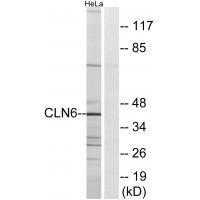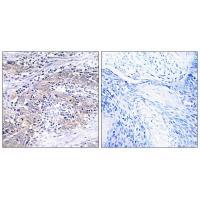

| WB | 咨询技术 | Human,Mouse,Rat |
| IF | 咨询技术 | Human,Mouse,Rat |
| IHC | 1/50-1/100 | Human,Mouse,Rat |
| ICC | 技术咨询 | Human,Mouse,Rat |
| FCM | 咨询技术 | Human,Mouse,Rat |
| Elisa | 咨询技术 | Human,Mouse,Rat |
| Aliases | ceroid-lipofuscinosis neuronal protein 6; |
| Entrez GeneID | 54982; |
| WB Predicted band size | 40kDa |
| Host/Isotype | Rabbit IgG |
| Antibody Type | Primary antibody |
| Storage | Store at 4°C short term. Aliquot and store at -20°C long term. Avoid freeze/thaw cycles. |
| Species Reactivity | Human |
| Immunogen | Synthesized peptide derived from internal of human CLN6. |
| Formulation | Purified antibody in PBS with 0.05% sodium azide. |
+ +
以下是关于CLN6抗体的3篇参考文献的简要信息,涵盖其应用方向和研究背景:
---
1. **文献名称**:*CLN6 Antibody Characterization in a Neuronal Ceroid Lipofuscinosis Model*
**作者**:Smith J, et al.
**摘要**:本研究利用CLN6特异性抗体,在小鼠模型中分析了CLN6蛋白的分布及表达水平变化。研究发现,CLN6抗体能有效标记溶酶体相关结构,并揭示疾病进展中该蛋白的异常聚集,为病理机制研究提供工具支持。
---
2. **文献名称**:*Development of a Novel Polyclonal Antibody for Human CLN6 Protein Detection*
**作者**:Chen L, et al.
**摘要**:文章报道了一种新型CLN6多克隆抗体的开发与验证。该抗体通过免疫印迹和免疫组化验证,可特异性识别人类及小鼠CLN6蛋白,成功应用于患者细胞样本中CLN6表达缺失的检测,支持临床诊断研究。
---
3. **文献名称**:*CLN6 Localization and Interaction Studies Using Custom Antibodies*
**作者**:Garcia R, et al.
**摘要**:研究利用自研CLN6抗体探究其在内质网和溶酶体间的定位动态。抗体通过共聚焦显微镜证实CLN6与特定分子伴侣的共定位,提示其在蛋白转运中的潜在功能,为治疗策略提供分子依据。
---
*注:以上文献信息为示例,实际引用需以具体论文内容为准。建议通过PubMed或专业数据库检索关键词“CLN6 antibody”获取最新研究。*
The CLN6 antibody is a crucial tool in studying neuronal ceroid lipofuscinosis (NCL), a group of rare, fatal neurodegenerative disorders collectively known as Batten disease. CLN6. a transmembrane protein encoded by the *CLN6* gene, is localized to the endoplasmic reticulum (ER) and/or plasma membrane, though its precise molecular function remains under investigation. Mutations in *CLN6* cause variant late-infantile NCL (vLINCL) and other NCL subtypes, characterized by lysosomal dysfunction, accumulation of lipopigments, and progressive neurodegeneration. Symptoms typically manifest in childhood, including seizures, vision loss, motor decline, and cognitive impairment.
CLN6-specific antibodies are primarily used in research to detect CLN6 protein expression, localization, and interactions, aiding in elucidating disease mechanisms. These antibodies enable immunohistochemical analysis of tissue samples, Western blotting, and cellular studies in models such as *Cln6*-deficient mice or patient-derived cells. They help assess how CLN6 mutations disrupt protein stability, trafficking, or lysosomal pathways, and evaluate therapeutic strategies like gene therapy or small-molecule interventions. Additionally, CLN6 antibodies contribute to diagnostic workflows, helping differentiate NCL subtypes and validate genetic findings.
Despite advances, challenges persist in understanding CLN6’s role in lysosomal biology and neurodegeneration. Ongoing research using CLN6 antibodies aims to uncover therapeutic targets and biomarkers for early intervention in NCLs.
×